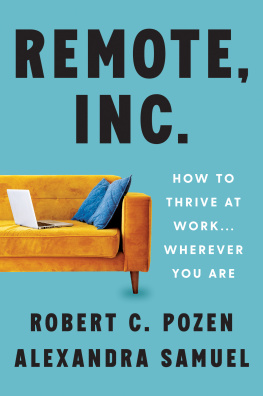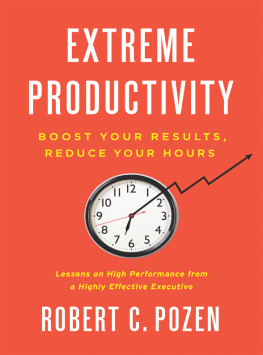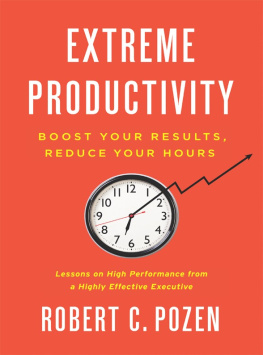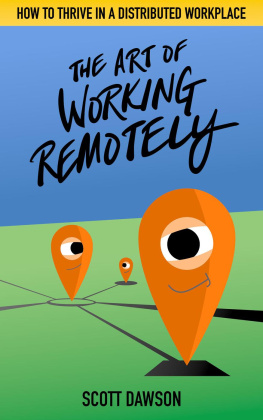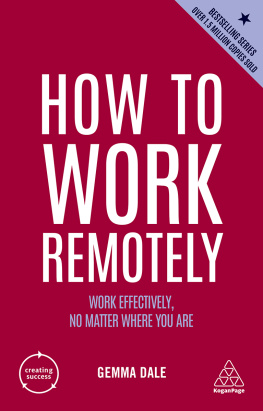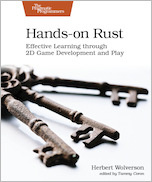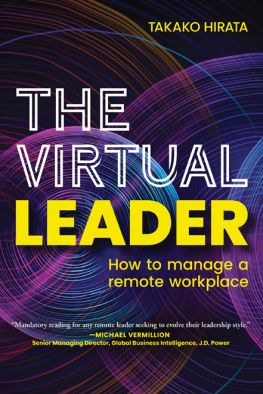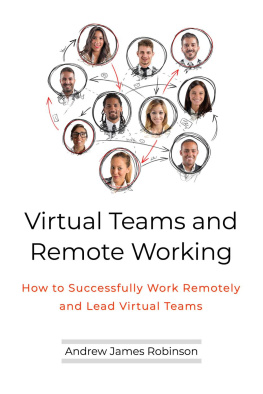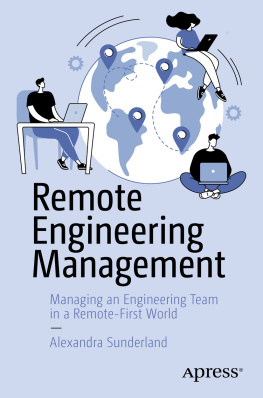For Liz and Rob,
who make it a joy to work from home
Contents
Highlighting the practical how-tos youll find in each chapter
How to
- Power up remote work with a new mindset
- Quickly review the key takeaways from this book
- Find specific guidance for your remote work challenges
- Read this book with your colleagues or team
How to
- Focus on outcomes, not hours
- Let go of the nine-to-five workday
- Wow your boss while working remotely
- Gain control over how and when you work
How to
- Set expectations for your hours and availability
- Have fewer meetings with punctuated collaboration
- Make the case to your boss for remote work
- Build your own performance file
How to
- Negotiate success metrics for key objectives
- Set ground rules for communicating as a distributed team
- Use team meetings to strengthen company culture
- Hold effective remote performance reviews
How to
- Drive your remote work with clearly prioritized objectives
- Balance professional goals with personal priorities
- Tie your daily tasks to your big-picture objectives
- Match your time allocation to your top goal
How to
- Work efficiently by starting from desired outcomes
- Eliminate wasted effort by drafting tentative conclusions
- Use midflight reviews to stay in sync with your boss and team
- Use pilot tests to get customer and expert feedback
How to
- Avoid procrastination pitfalls when working from home
- Reduce your efforts on low-priority tasks
- Use multitasking to make better use of time on calls
- Respond immediately to important requests
How to
- Protect your schedule from back-to-back meetings
- Set goals for every call or meeting
- Create routines that save energy
- Structure your eating and exercise habits
How to
- Set up your calendar, task list, and time tracking
- Get the right tech gear for your home office
- Choose the right software for any project
- Build your own remote work dashboard
How to
- Share workspace with family or roommates
- Find new spaces to get your work done
- Get the most out of coworking spaces
- Dress for home office success
How to
- Have fewer and shorter meetings
- Make online meetings more effective
- Avoid low-value meetings diplomatically
- Leave a meeting with clear next steps
How to
- Keep up with industry news while youre at home
- Beat the disadvantages of reading online
- Use audio tools to fit more reading into your day
- Build a read-it-later file and a clipping file
How to
- Use outlines to overcome writers block
- Work with colleagues to draft documents online
- Give and get feedback through online collaboration
- Choose the right software for any writing project
How to
- Know when to email, call, or message
- Conquer email overload by automating your attention
- Write emails that drive people to action
- Use team messaging to get answers quickly
How to
- Build a network of trusted colleagues
- Resist distractions from social media
- Pick a niche to showcase your expertise online
- Maintain your presence in three hours a week
How to
- Adapt your speaking style for online presentations
- Ask the questions that help you plan your presentation
- Create slide decks that work well online
- Engage the participation of a virtual audience
How to
- Build a schedule that combines home and office work
- Recognize when you need more time at the office
- Recognize when you need more time at home
- Plan your career around remote work
How to
- Demonstrate the benefits of remote work
- Get seven quick wins as a remote worker
- Deliver seven big wins for your organization
- Foster a healthy remote work culture
S hould you check your email before you eat breakfast, or carve out some personal time before you sit down at your home computer? Do you need to talk with each of your remote reports every day, or can you trust that theyre making progress toward their deliverables? Should you block off a day to get your memo written, or try to fit the work into the gaps between your various online meetings? Do you need to turn on your camera for this Zoom call, or can you listen in while quietly doing the dishes?
These are the typical dilemmas that characterize our day-to-day experiences as home-based workers. Many of us are working from home for the first time, due to Covid, and still hoping its temporary; others of us have worked remotely, either full- or part-time, for many years.
In either case, we now have to grapple with a world in which remote work has become, if not the rule, then certainly no longer the exception. And we are also learning to do remote work without being able to count on the haven of coworking spaces or the sanctuary of the local coffee shop. Even folks who have long worked remotely may struggle to adapt to the expectations and norms that emerge as remote work goes mainstream.
Its a very challenging context in which to figure out the work habits and collaboration strategies that can make you most productive as a remote worker. But youre not a remote worker: youre Remote, Inc.
Remote, Inc. means thinking like what we call a Business of One. Whether youre early in your career with a large organization, managing a small team, or a self-employed freelancer, you should try to adopt the mindset and habits of a small business owner.
Thats because every single home office is, essentially, its own freestanding enterprise. Your boss is effectively your client, and you are effectively in the position of a vendor or supplier. Your boss gives you the orders for products and services, and it is up to you to complete those orders on time and on budget.
That means you should approach your work as a series of deliverables: youre accountable for each deliverable, whether it is a marketing plan for a product launch, a new feature for a software program, or an ethics manual for new hires.
Thinking of yourself as Remote, Inc. means you have the responsibility and accountability of a business owner, but also the flexibility and independence. It means thinking in terms of outcomes and final products, instead of schedules and billable hours. It means organizing the pace and timing of your work around your own priorities and goals, instead of being forced to bend your priorities to fit into the straitjacket of the modern nine-to-five workplace.
Far from consigning you to a lifetime of working from home, the productivity skills and mental habits that you develop as Remote, Inc. will serve you very well if and when you return to working in an office, even if its only part-time. Learning to think like a business owner will make you more efficient and more focused, and it will strengthen your time management skills in ways that help you get the most out of every day.
Just as important, thinking like a Business of One will make you more valuable to your employer and clients. Managing a distributed team that requires constant hand-holding is an enormous drain on any organization, but that is whats required if remote employees depend on daily or even hourly direction in order to make effective use of their time. By embracing the Business of One mindset, remote workers address this management challenge by delivering consistent, high-quality results while requiring far less overhead in the form of supervision and infrastructure. Your goal is to make

